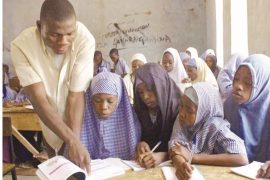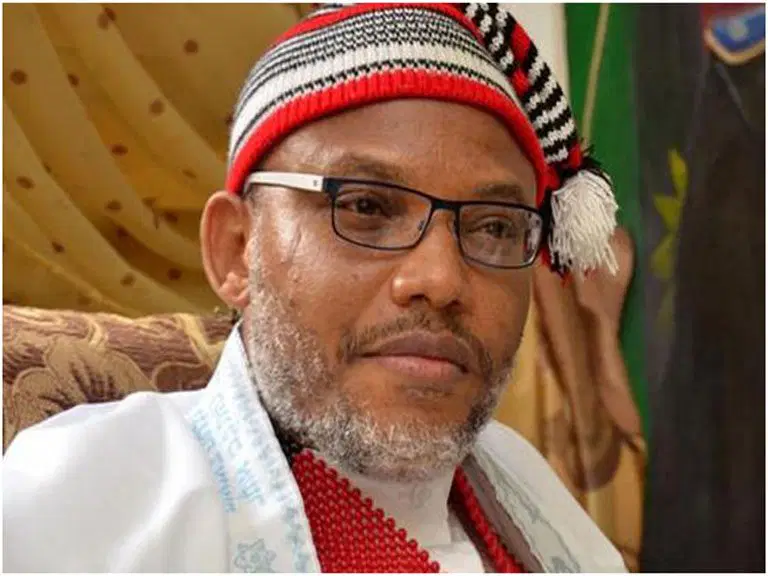Nigeria’s Education: Of rote-learning, code-cracking and other tragedies

Photo Credit: Leadership Newspaper
By Ikenna Ugwu, Enugu
When the Federal Ministry of Education has a mission “to use education for fostering development of all Nigerian citizens to their full potentials…” but create and sustain environments inimical to the fulfilment of such goals, we see the beginning of the end of a failed nation. The education mix is a key player in the development trend puzzle of any nation, and must be seen as such. But Nigeria’s dispassionate and nonchalant posture about education in the country leaves little to be desired, and so calls for concern.
When I was still a little boy, each time my mother sent me on errand, usually, I turned the message into a song. The idea was to not forget the message. It was something most of us did. But we often ran into trouble with that method of trying to commit idea to memory. I did. The problem was, once you break to say good morning to a passing elder, the message is gone in the song. What you have left is a head swept clean. Somehow, unfortunately, this learning pattern managed to creep into our educational environments.
This is how:
In our nursery or kindergarten schools, the teacher also turns every idea or information into a song. The children recite it over and over, until they forget the idea and fall in love with the song. So it is the song that appeals to them and not the message or idea in the song. But as they grow, such songs become too simple and ordinary. And gradually, they lose interest in the song. When this happen, chances are high they forget the real substance, the messages in the song – just like we did. This approach to learning rubs off on us in many adverse ways.
Let’s take a simple test: (1) Unaided, write out the 36 Nigerian states and their capitals and (2) write the national anthem or pledge without necessarily reciting them. (3) state, sincerely, how committed you are to each word and terms in question 2. If you obeyed the instructions and got the answers in 1 and 2 correctly, forget it, you are a genius. But then, let’s be real; how many adult Nigerians do you honestly think can score pass mark here? I am a terrible critic, so I will leave you to judge. But I bet your assessment won’t be far from mine. How many of the things you learned in your nursery, primary and even secondary school can you remember now, with minimal mental effort? If you are struggling with the answers, then you are with me in the thought that, from the beginning, we lay foundations for failure, a stumbling block for progress.
So from the kindergarten, we sing our lives into primary school. It is the life and story of nearly every Nigerian child, especially those who attend public schools; he works so hard to recite and memorise passages of the English Course, Basic Sciences, and multiplication tables and other mathematical signs. While children in (saner) societies – let’s leave America and Britain alone – learn technology, our teachers keep our heads busy learning body parts of insects. It’s not a joke. See, teachers in local communities in my state still ask pupils to draw and label hoes, cutlasses, sickle, baskets etc as farm implements. Again, while the world talks technology and mechanization in farming, aggressively pursuing knowledge economy, we still teach our children how they can use hoes and cutlasses and all those things for farming. Such a terrible limitation!

The “cooperation” that wrecks
In most Nigerian schools, when you cannot trust yourself, the option available is to align with your ilk to reach the “goal”. It is the most pathetic thing you can see in the education environment. The average Nigerian pupil learn to “corporate” and work in “teams” during exam, to avoid slip-ups where they are inadequate. No single person knows everything after all, so “cooperation” is justified. So during exams, they grow long necks, invisible hands and speak inaudible but comprehensible sounds to themselves. In the end, they pass the exams, which is the ultimate. The teacher gives them a passing grade, and they are good.
The sad story is that, at the early level of education in Nigeria, we fail to create in the mind of a child, one of the most precious attributes possible – character and self-consciousness. It rather subject susceptible minds to series of critical assessment – test and examinations that exposes them to the reality of being intelligent or stupid. This is not fair on innocent children. Nursery school, for instance, should be a preschool environment, somewhere the kids are encouraged to play and express themselves while their parents are at work. In play these youngies discover themselves. The whole essence of the experience is to allow the child to explore and discover his many creative potentials. Then the teacher, guiding him, take it from there. “It is the supreme art of the teacher”, Albert Einstein reckons, “to awaken joy in creative expression and knowledge.”
The education system has a responsibility to establish a system that encourage strong character, discipline, independence and hard work. Sadly, the system here is interested in a “gaming” practice that accommodates compromises to reach the “goal”. This partly, is why we remain and may continue to remain a “third world” country. Children in Japanese schools, for instance, are not accessed with exams till they reach 4th grade. The reason is that the country has created a system that do not judge a child’s knowledge or learning with the first three years of school. During these years, the teachers are expected to develop the character and morals of children. In essence, Japanese teach character and manners before knowledge.
Finland is a small country famous for its incredible education system – one of the best in the world. In Finland, children do not go to school until age 7. The idea is to allow them sufficient time to enjoy childhood and spend quality time with their families before they are ready for schools. Mind you, Finland’s education system sits comfortably on the fifth position in the world after South Korea, Japan, Singapore and Hong Kong. But the Nigerian system, unfortunately rushes children into and out of schools. The result is ‘educated’ folks that create more problems than solutions in the society. We are in a different kind of world, certainly.
The amorality in “extra morals”
After five years of primary education experience most pupils in Nigeria remain largely unprepared for School Leaving and Common Entrance examinations. Consequently, and guided by our darling parents who want “the best” for us, they are reeled into “extra moral” classes – an amoral experience that exposes both teachers’ and students’ ineptitude and poor learning attitude respectively. I call it code-cracking. If you do not understand what I mean by code-cracking, take a walk around town, almost in any part of the country. You will find buildings, streets walls and even trees heavily mutilated with bills calling for enrollment into WAEC/NECO, GCE, JAMB and other lesson classes. Yes, a prolific rash of coaching centers is what fills the gap when pupils and students are not adequately prepared for the next-levels in education. So the centers “prepare” candidates for competitive qualifying and entrance exams. The bad news is; these centers are not interested in building the competences or intelligence required in effective student, or professional. They just help to crack the code, a pass into the next level.
In the end, if you are lucky – like most of us were – beating the illogical high standard and huddles set by an education system with poor learning practice, you scale up into the envied secondary or university experience.
In school but not learning
There is enormous veracity in Bill Clinton’s statement that “we are living in a world where what you earn is a function of what you can learn.” But our great undoing is that we live in a time and clime where learning has been reframed and redesigned to suit our impetuous goals; a country where many, despite a staggering poor statistics of the number of out of school children (OSC), are in school but not learning.
There exists an unhealthy understanding that education is a process that affords you a sweet opportunity to acquire a certificate that guarantees you a ‘good’ job, especially a white-collar job. So people are in reckless haste to enter, obtain certificate and exit. We have so greatly misconstrued the idea and reason for education, and that’s a big problem. “Once you tell children that education is only for jobs, writes Ory Okolloh Mwangi, “it is the end of learning”. Janathan Fritzler writes of our kind of education in “Hack Your Education” as a “rite of passage”, something you just have to go through to get to the next stage of your life. Such is the prism through which we see education and learning in this part of the world. But those are inevitable symptoms of a doomed nation.
Nigeria has an education system that force-feed students: cramming and rote-learning – of course for effective “garbage in garbage out”. Education, we must understand, according to B.F Skinner, is what survives when what has been learned has been forgotten. But the hurting irony is that we forget about 80% of what we learn in school after graduation. So what’s the point, if what we learn in school we can’t apply in life situations years later? Unfortunately, this leaves us with half-baked, ill-equipped graduates. Someone calls them “educated illiterates” – a painful paradox.
Nigeria has an education system that force-feed students: cramming and rote-learning – of course for effective “garbage in garbage out”. Education, we must understand, according to B.F Skinner, is what survives when what has been learned has been forgotten.
Steven Covey makes a pertinent remark: “we often go for the illusion of ‘cramming’ instead of the reality of long term development and growth. We are into ‘get the degree…so you can get the job…so you can get the money…so you can buy the things…so you will be successful.” And again he asks, “But what does that kind of ‘success’ bring? The same character and competence that come from deep, continuous investment in learning and growth?” I think that Covey’s remark and question holds us, all of us as a people, culpable. It is something we must consider. Students consider such compromises as sex-for-marks, “sorting” and other forms of shortcuts as “means to the end” because the system encourages it in many regrettable ways.
More odds
In Nigerian universities, if you question the authority of your lecturer, especially in a manner that suggests you know something more than he does, you become a victim. He is your mentor. You are his subject. You have to listen to him, and until he gives you that passing grade you are not good enough. So from the start of the semesters and sessions, the only thing on the student’s mind is that the end is near. This is how the human mind is stifled and strangled, till there is no life in it. And it dies. Nations die individuals. Yes. But in Abraham Lincoln’s wisdom we can learn that “you cannot build character and courage by taking away man’s initiative and independence”. A curious mind should be free and bold to inquire until his curiosity, to a reasonable extent, is satisfied. Forget our fervid proclivity for religion and believe that God is out to do whatever we desire. If you have been to any Nigerian university lately, and understand the intrigues that play out, you will see the need to be worried for the future of the country.
On the other hand, students are mostly averse to interactions or questioning that exposes them in bad light before the lecturer. In presentation classes, (individual or group), if you ask presenters much questions, or speak spiced English, they call you over sabi. And of course you are an “enemy of progress”. You are trying to reduce their GP. Asking too many questions, they believe, naturally exposes student’s ignorance and stupidity, and most of them are afraid of this. But this eroding wittiness and insanity is something we must recognize and conquer. As Eckhart Tolle writes, “to recognize one’s own insanity, is of course, the arising of sanity, the beginning of healing and transcendence”. Part of why a student is sent to the university is to develop an independent and critical mind.
So what’s the point, if what we learn in school we can’t apply in life situations years later?




